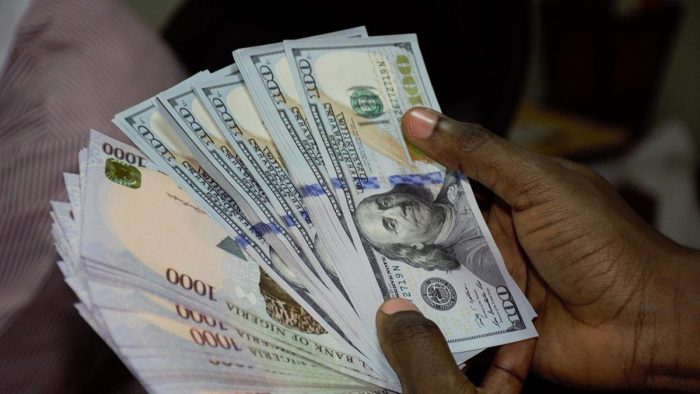The naira on Wednesday fell against the dollar for the second time in the official market, since the introduction of the new trading platform by the Central bank of Nigeria (CBN), due to increased demand for the US currency.
After trading on Wednesday, the naira depreciated by 1.3 percent or N20 as the dollar was quoted at N1,545 compared to N1,525 quoted on Tuesday on the Electronic Foreign Exchange Matching System (EFEMS), data from the CBN showed.
Authorised currency dealers quoted the dollar at the rate of N1,557 per dollar on Wednesday, slightly stronger than N1,560 quoted on Tuesday. The market recorded a lower bid of N1,515 per dollar, which was lower than N1,500 quoted on the previous day.
The naira on Wednesday continued its third straight free fall on the parallel market depreciating to a new low of N1,710 per dollar since the introduction of the EFEMS by the CBN.
Currency traders blame the renewed naira depreciation to increased demand for dollars by importers and individuals traveling for tourism, health and other needs. “The dollar dropped earlier because people were not buying as they were ‘waiting and watching’ the CBN’s new electronic trading platform but now they have resumed buying and selling,” one trader told BusinessDay.
Read also: Naira records N147.69 gain since EFEMS commencement
On Tuesday, November 26, 2024, the CBN issued a directive which required all banks operating in the interbank FX market to adopt the Bloomberg BMatch system for trading. The platform, which became operational on December 2, 2024, aims to enhance transparency and operational efficiency in Nigeria’s FX market.
The CBN also issued comprehensive guidelines for the operations of the interbank foreign exchange (FX) trading system via the Electronic Foreign Exchange Matching System (EFEMS), pegging the minimum tradable amount at $100,000 with incremental clip sizes of US$50,000.00, to promote transparency and efficiency in the FX market.
Omolara Duke, the CBN’s director of the financial markets department, announced this in a circular sent to all banks on Tuesday. According to Duke, the EFEMS initiative is designed to ensure “transparent, fair, and efficient FX trading, minimise counterparty risks, and enforce compliance with CBN regulations.”
Join BusinessDay whatsapp Channel, to stay up to date
Open In Whatsapp





